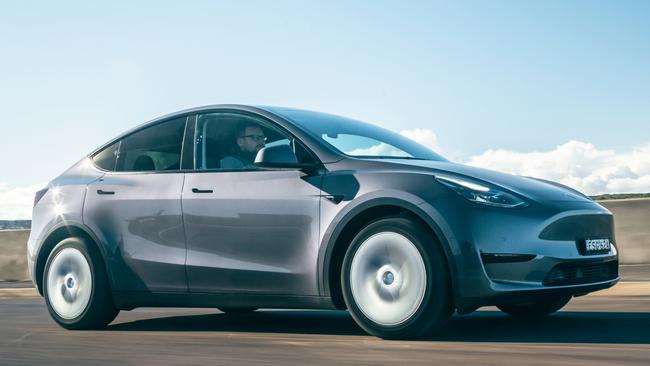Car makers reluctant to reveal price of EV replacement batteries
Car makers are offering long warranties for electric vehicle batteries but they are less than forthcoming about the replacement cost.
Motoring News
Don't miss out on the headlines from Motoring News. Followed categories will be added to My News.
Car makers are baulking at revealing the cost of replacement batteries for electric vehicles, with good reason.
Lexus has revealed that a replacement for the battery in its UX electric SUV is $43,476 plus GST. That’s more than half the price of the car, which retails for about $82,500.
An engine replacement costs about $12,000 for the popular Ford Ranger ute or roughly $6000 for a small hatchback such as a Hyundai i30.
News Corp asked ten manufacturers to reveal the cost of their replacement batteries and Lexus and Nissan were the only two to reveal any prices.
Tesla, Mazda, BMW, Mercedes-Benz, Hyundai, Kia, MG and Mitsubishi did not provide any numbers.
Car makers argue the replacement cost is a moot point because most of the cars on sale have eight-year warranties and battery prices are expected to fall dramatically in the intervening period.
Lexus has a ten-year/unlimited kilometre warranty for its batteries, provided the customer “adheres to servicing requirements outlined in the owner’s handbook”.

If battery capacity dips below 70 per cent within 10 years or 160,000km, the brand will replace it.
The average age of a car in Australia is roughly 10 years, so most long-term owners – or second hand EV buyers – will face a period where the battery is no longer under warranty.
Nissan, which has been selling the Leaf EV in Australia since 2012, says the “overwhelming majority” of Leafs are still using their original battery pack.
For those whose battery is no longer under warranty, the brand has a replacement program that costs $9990 plus labour.
The original Leaf had a battery “state of health” warranty period of five years, while the new model, launched in 2019, has an eight-year, 160,000km warranty.

A spokeswoman for the brand said all batteries lost capacity as they aged but “the extent of this degradation is highly dependent on usage and conditions”.
“The cost of a replacement battery after this period is purely speculative at this point as the cost of manufacturing batteries continues to decline over time,” she said.
She said the company had not come across a situation where a battery was damaged and the vehicle involved was repairable.
“Given the location of the battery in the floor/chassis of the vehicle, any impact or damage that has occurred to the battery (requiring a replacement) has also come with high level of structural damage to the vehicle and therefore the vehicle is not typically repairable,” she said.
She said the Nissan Leaf had a battery state of health readout in the centre screen that clearly showed the remaining capacity. The display has 12 bars and Nissan will replace a battery if it falls below nine during the warranty period.

The display also serves as a good guide for people looking to buy a used Leaf.
Australia’s top-selling EV brand, Tesla, wouldn’t disclose battery replacement costs for its vehicles, some of which have been on sale locally since 2014.
Many of its Model S vehicles are approaching the end of the brand’s eight-year battery warranty.
The brand covers its Model Y and Model 3 vehicles with an eight-year/160,000km warranty, promising 70 per cent retention of the battery capacity in that period.
Mercedes-Benz guarantees the battery life of its EQS and EQE models for up to 10 years or 250,000, with a degradation target of 70 per cent.

Its EQA, EQB and EQC EVs are covered for eight years and 160,000km.
A spokesman said: “No general information can be given about the cost of exchanging batteries as this can vary. The cost depends on the type of battery and the vehicle model at the time a replacement battery is required outside of warranty,” he said.
Hyundai has a eight-year/160,000km warranty for its EVs but won’t reveal replacement costs. In the United States, it has a battery refurbishment program that costs significantly less than replacement.
Sister brand Kia has a shorter seven-year/150,000km warranty and also declined to reveal replacement costs by our story deadline.
BMW, MG and Mazda were contacted but have not provided any details on replacement costs.
Mitsubishi says the battery replacement cost for its Eclipse Cross PHEV, which uses a 13.8kWh battery, is $11,745.87 plus GST, including fitment.
The new Outlander PHEV, which uses a bigger 20kWh battery, costs $15,764.01 plus GST including fitment.





